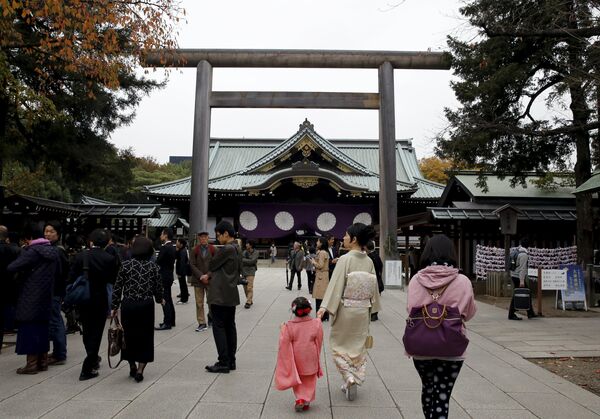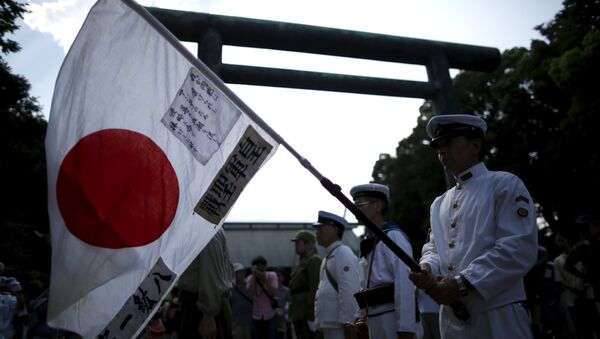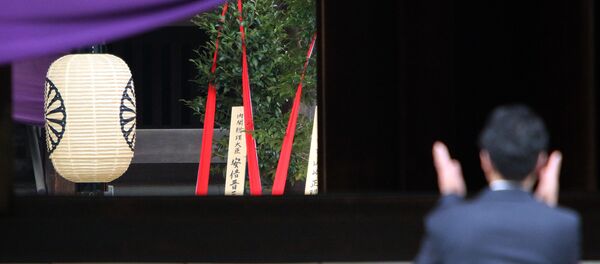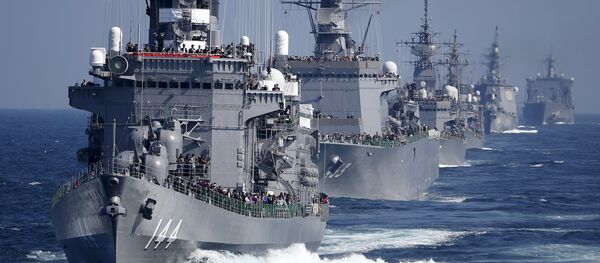China and South Korea were quick to condemn the visit. However, according to Russian historian and commentator Dmitry Verkhoturov who spoke to Sputnik Japan, the protests from China and South Korea are rather too numerous to draw any particular attention.
Of course, the act of Japanese officials visiting the Yasukuni shrine is a rather controversial issue. It touches upon not only the historic memory of WW2, but also the future development of the Japan Self-Defense Forces. China, for one, anticipates Japan turning into a major military power.
Regarding the possibility of the progressive transformation of the Japan Self-Defense Forces into a full-featured army, Verkhoturov explains that the threat of this happening has been heavily exaggerated.
"From this point of view the development of the Japanese armed forces, including marine and air forces is sensible, because Japan should defend not only its territory, but also its waters," — Verkhoturov states.
“Secondly, Japan’s stature on the world stage has changed dramatically over the 70 years since WW2. Now it is surrounded by countries which are militarily strong. Russia, China, South and North Koreas have powerful armed forces. Other countries of the region have recourse to their strong allies.
These circumstances make any idea of Japanese military aggression look somewhat reckless.Japan simply is not able to attack any other country of the region without the risk of crushing military retaliation by any and all means, including the use of nuclear weapons,” — said Verkhoturov.
“Thirdly, any major war requires lots of materials and oil which Japan does not have. And its sea supply is highly assailable, as it was during WW2.”
“In the fourth place, as post-war experience has shown, Japanese businessmen have conquered much more than Japanese generals. Today the sphere of Japan’s economic and cultural influence is much wider than WW2 Japanese generals could imagine in their wildest dreams,” said the historian.
“Nowadays Japan can get everything necessary for its flourishing in a purely peaceful way. For example, if Japanese-Russian talks are successful, Japan will get access to a wide array of valuable natural resources,” — explained Verkhoturov.
Based on this premise, Verkhoturov argues that today any talk of Japan having aggressive expansion plans is absurd.

Verkhoturov is somewhat dismissive of the complaints regarding the Japanese officials visit to the Yasukuni shrine.
“The claims of Chinese and South Korean governments are nothing but an intervention into the internal affairs of Japan. The Japanese government does not tell Chinese or Korean officials which shrine they should visit, and which shrine they should not,” — Verkhoturov says.
Verkhoturov also emphasizes that WW2 was a total disaster for Japan resulting not only in international condemnation of its aggressive politics and war crimes, but also in innumerous human losses, colossal material damage and nuclear devastation.
“In my view, Japan has paid for the militarist ambitions of its wartime leaders,” — Verkhoturov remarks.
“After all, the soldiers and officers of the Japanese imperial army whose names are listed at the Yasukuni shrine carried out orders at the expense of their lives. So blaming them for the policy of their government or crimes of particular persons is at least unmoral,” — Verkhoturov claims.
“As for the Soviet Union, it was a victim of German aggression; nevertheless it did not confer responsibility for Nazi war crimes on every soldier and every officer of the German army. Only those who were personally in charge of the crimes have been convicted. The majority of German war prisoners were repatriated a few years after the war was over.”
In Germany there are many monuments to the victims of war, reminding that military aggression cannot be justified.East Germany, for example, pledged to never resort to war again and included into its national anthem the following line: “So that a mother never more mourns her son”. “So why should not Japan have such monuments?” – Verkhoturov wanders.
“The Yasukuni Shrine lists the names of 2.5 million people and animals, and only 14 among those are recognized as A-class war criminals. So, the claims of China and South Korea in their essence criminalize many Japanese soldiers and officers who have never been convicted for any crimes by any tribunal,” — Verkhoturov believes.
The expert also considers that the issue of listing in the shrine the name of those 14 A-classwar criminals should be studied individually as a matter of law to determine whether the tribunal sentence means no right to a postmortem pardon. If so, the tablets with their names should be removed from the shrine. “As far as I am aware, epitaphs to war criminals are not prohibited under any rules of tribunals or international criminal legislation,” — Verkhoturov concludes.






